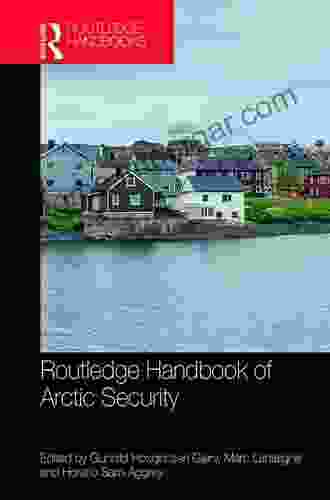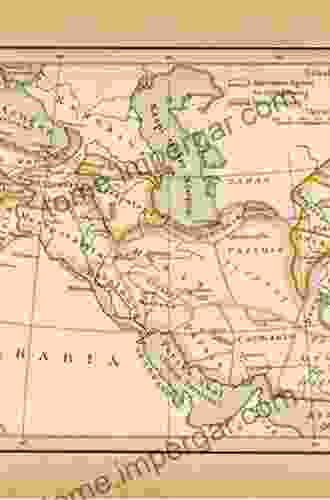The Routledge Handbook of Arctic Security: A Comprehensive Guide to the Geopolitics of the Arctic

Table of Contents
- Arctic Security: An Overview
- The Arctic and International Law
- The Geopolitics of the Arctic
- The Arctic and Climate Change
- The Arctic and Energy Resources
- The Arctic and Security Challenges
The Arctic is a region of growing importance, both in terms of its natural resources and its strategic location. As the ice caps melt and the Arctic becomes more accessible, it is becoming increasingly important to understand the security challenges and opportunities in the region.
The Routledge Handbook of Arctic Security is a comprehensive guide to the geopolitics of the Arctic. It provides a detailed overview of the region's history, geography, and resources, as well as an analysis of the security challenges and opportunities facing the Arctic.
5 out of 5
| Language | : | English |
| File size | : | 14165 KB |
| Screen Reader | : | Supported |
| Print length | : | 462 pages |
| X-Ray for textbooks | : | Enabled |
This handbook is an essential resource for anyone interested in the Arctic, including policymakers, scholars, and students. It provides a wealth of information on the Arctic, and it helps readers to understand the complex security challenges facing the region.
Arctic Security: An Overview
The Arctic is a region of immense strategic importance. It is home to vast natural resources, including oil, gas, and minerals. It is also a major shipping route, and it is becoming increasingly accessible as the ice caps melt.
The Arctic is also a region of significant environmental vulnerability. The Arctic ecosystem is delicate, and it is threatened by climate change. The melting ice caps are causing sea levels to rise, and they are also exposing new landmasses to exploitation.
The convergence of these factors is creating a number of security challenges in the Arctic. These challenges include:
- The potential for conflict over resources
- The need to protect the Arctic environment
- The challenges of search and rescue in the Arctic
- The need for cooperation between Arctic states
The Arctic and International Law
The Arctic is a region that is governed by a complex web of international laws. These laws include:
- The United Nations Convention on the Law of the Sea (UNCLOS)
- The Arctic Council
- The Oslo Accords
- The Svalbard Treaty
These laws provide a framework for cooperation between Arctic states. They also help to protect the Arctic environment and to ensure the safety of navigation in the region.
The Geopolitics of the Arctic
The Arctic is a region of great geopolitical importance. It is home to eight Arctic states: Canada, Denmark, Finland, Iceland, Norway, Russia, Sweden, and the United States. These states have competing interests in the Arctic, and they are working to secure their claims to the region's resources.
The Arctic is also a region of growing interest to non-Arctic states. China, India, and Japan are all seeking to increase their presence in the Arctic. These states are interested in the region's resources, and they are also concerned about the security implications of climate change.
The geopolitics of the Arctic is complex and evolving. The Arctic states are working to balance their competing interests, and they are also seeking to cooperate on issues of mutual concern.
The Arctic and Climate Change
Climate change is having a profound impact on the Arctic. The Arctic is warming at twice the rate of the rest of the world, and the ice caps are melting at an accelerating pace.
The melting ice caps are opening up new shipping routes and making the Arctic more accessible to exploitation. They are also causing sea levels to rise, which is threatening coastal communities and infrastructure.
Climate change is also having a significant impact on the Arctic ecosystem. The melting ice caps are exposing new landmasses to erosion, and they are also changing the distribution of plant and animal species.
The impacts of climate change on the Arctic are a major security challenge. The melting ice caps are creating new opportunities for conflict, and they are also threatening the livelihoods of Arctic communities.
The Arctic and Energy Resources
The Arctic is home to vast energy resources. These resources include oil, gas, and minerals. The Arctic is estimated to contain 13% of the world's undiscovered oil and 30% of the world's undiscovered gas.
The development of Arctic energy resources is a major challenge. The Arctic is a harsh and unforgiving environment, and the cost of extracting resources is high. There are also significant environmental concerns associated with Arctic energy development.
Despite the challenges, Arctic energy resources are becoming increasingly important. As the world's demand for energy grows, the Arctic is likely to become a major source of oil and gas.
The Arctic and Security Challenges
The Arctic is facing a number of security challenges. These challenges include:
- The potential for conflict over resources
- The need to protect the Arctic environment
- The challenges of search and rescue in the Arctic
- The need for cooperation between Arctic states
The potential for conflict over resources is a major concern in the Arctic. The Arctic is home to vast energy resources, and there is a risk that these resources could become a source of conflict between Arctic states.
The need to protect the Arctic environment is also a major security challenge. The Arctic ecosystem is delicate, and it is threatened by climate change and pollution. The Arctic states need to cooperate to protect the Arctic environment and to ensure the sustainability of the region's resources.
The challenges of search and rescue in the Arctic are also significant. The Arctic is a vast and remote region, and it can be difficult to conduct search and rescue operations in the harsh conditions. The Arctic states need to cooperate to develop and maintain effective search and rescue capabilities.
The need for cooperation between Arctic states is essential to addressing the security challenges facing the region. The Arctic states need to work together to manage the region's resources, to protect the Arctic environment, and to ensure the safety of navigation in the region.
The Arctic is a region of growing importance, both in terms of its natural resources and its strategic location. It is facing a number of security challenges, but it also offers a number of opportunities for cooperation between Arctic states.
The Routledge Handbook of Arctic Security is a comprehensive guide to the geopolitics of the Arctic. It provides a detailed overview of the region's history, geography, and resources, as well as an analysis of the security challenges and opportunities facing the Arctic.
This handbook is an essential resource for anyone interested in the Arctic, including policymakers, scholars, and students. It provides a wealth of information on the Arctic, and it helps readers to understand the complex security challenges facing the region.
5 out of 5
| Language | : | English |
| File size | : | 14165 KB |
| Screen Reader | : | Supported |
| Print length | : | 462 pages |
| X-Ray for textbooks | : | Enabled |
Do you want to contribute by writing guest posts on this blog?
Please contact us and send us a resume of previous articles that you have written.
 Book
Book Novel
Novel Page
Page Chapter
Chapter Text
Text Story
Story Genre
Genre Reader
Reader Library
Library Paperback
Paperback E-book
E-book Magazine
Magazine Newspaper
Newspaper Paragraph
Paragraph Sentence
Sentence Bookmark
Bookmark Shelf
Shelf Glossary
Glossary Bibliography
Bibliography Foreword
Foreword Preface
Preface Synopsis
Synopsis Annotation
Annotation Footnote
Footnote Manuscript
Manuscript Scroll
Scroll Codex
Codex Tome
Tome Bestseller
Bestseller Classics
Classics Library card
Library card Narrative
Narrative Biography
Biography Autobiography
Autobiography Memoir
Memoir Reference
Reference Encyclopedia
Encyclopedia Rebecca Frankel
Rebecca Frankel John J J Chen
John J J Chen Solomon Jones
Solomon Jones William Antony
William Antony Beth Bianca
Beth Bianca Jerry Ellis
Jerry Ellis Sherry Inman
Sherry Inman Barton E Bernstein
Barton E Bernstein Benjamin Wohlert
Benjamin Wohlert Bernard Wilkin
Bernard Wilkin Jonathan Kingdon
Jonathan Kingdon David B Weems
David B Weems Reese Christian
Reese Christian Steve Edwards
Steve Edwards Bernard Whalen
Bernard Whalen Blair Reynolds
Blair Reynolds Bill Russell
Bill Russell Murray Maclean
Murray Maclean Benjamin W Niebel
Benjamin W Niebel Barbara Godin
Barbara Godin
Light bulbAdvertise smarter! Our strategic ad space ensures maximum exposure. Reserve your spot today!

 Albert ReedThe Indispensable Goat: An Exhaustive Encyclopedia for Goat Enthusiasts and...
Albert ReedThe Indispensable Goat: An Exhaustive Encyclopedia for Goat Enthusiasts and... Ralph EllisonFollow ·4.2k
Ralph EllisonFollow ·4.2k Shannon SimmonsFollow ·10k
Shannon SimmonsFollow ·10k Miguel de CervantesFollow ·6.5k
Miguel de CervantesFollow ·6.5k H.G. WellsFollow ·16.8k
H.G. WellsFollow ·16.8k Randy HayesFollow ·7.2k
Randy HayesFollow ·7.2k John ParkerFollow ·11.7k
John ParkerFollow ·11.7k Cameron ReedFollow ·17k
Cameron ReedFollow ·17k Tyler NelsonFollow ·19.5k
Tyler NelsonFollow ·19.5k

 Edison Mitchell
Edison MitchellFrench Strategy and Operations in the Great War
An In-Depth Examination of Military Genius ...

 Harvey Hughes
Harvey HughesArts In Health: Designing And Researching Interventions
Delving into the...

 Walt Whitman
Walt WhitmanHealing and Hope for Those with Empty Arms
A Comprehensive Guide for Grieving...

 DeShawn Powell
DeShawn PowellUniversity of Maine Ice Hockey: A Legacy of Frozen Glory
Nestled in the heart of Maine, a state...

 George Hayes
George HayesControl For Aluminum Production And Other Processing...
In today's competitive manufacturing...

 Ben Hayes
Ben HayesThe Lost Obelisks Of Egypt: A Journey into the Depths of...
: The Enduring Allure of Egypt's Ancient...
5 out of 5
| Language | : | English |
| File size | : | 14165 KB |
| Screen Reader | : | Supported |
| Print length | : | 462 pages |
| X-Ray for textbooks | : | Enabled |










